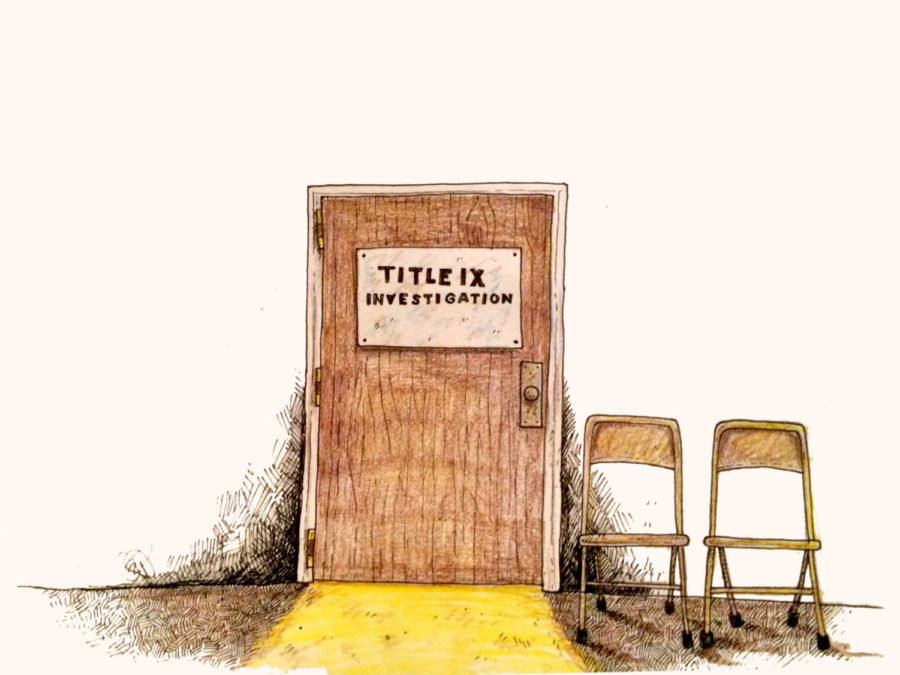Walking campus with my rapist
November 3, 2016
Ms. Patty Bender,
When I called this summer and you didn’t remember me, at first, I was shocked and appalled. But perhaps, I shouldn’t have been surprised at all. You see, Ms. Bender, for months, I was just a girl who came into the Title IX office a few times a month for an hour, and then I was on my way. I knew of you, but you were more of an idea than a person — a reference point; you were the decider of my rapist’s sanctions should he take responsibility for what he had done. I wasn’t granted the honor of meeting you until after I called and emailed repeatedly for a reply or explanation as to how a man who had accepted responsibility for sexually assaulting me was permitted to stay for weeks in the very residence hall where it happened.
You sat across from me in your office, and I felt as if you had turned to stone. I didn’t see you so much as flinch as I fell apart in anguish and frustration from what felt like a sting of betrayal. I had been presented with sanctions I felt comfortable with, sanctions that made sense. I had no reason to believe he wouldn’t be forced to leave campus the moment he accepted responsibility and the suspension. I was never told he would be able to finish out the semester. I wasn’t prepared to see him on campus after he admitted he raped me. I sat before you as Martha and Jeremy refused to meet my gaze because they know that I am not one to fall apart. What you didn’t see, Ms. Bender, were the dozen meetings I had been to without so much as a tear. I knew I wanted my story to be heard loud and clear; I never let myself so much as stutter in a meeting. I grimaced as you began sentence after sentence with, “If you had reported this sooner,” as if I am the guilty party. I wondered what happened to the victims who were raped later in the school year, if their rapists got away because of inconvenient timing. I barely registered what seemed like shallow offerings of how you were “following procedures” and working toward the “best possible outcome for the victim” through my labored breathing. I fought to steady my voice as I explained why this could not happen, why this was completely unacceptable — as if I needed to spell it out. And just when I thought my panic could not reach any higher, you looked me dead in the eye and said you “know how painful it is for a victim to go through this process.”
I wasn’t prepared to see him on campus after he admitted he raped me.
For a minute, I found it in my heart to empathize with you, Ms. Bender. I pitied that you had been through what I had, because that is the only way you could feel the authority to state that you “know how it feels.” But imagine my rage when you then admitted that you had in fact never been through it. Imagine my disgust when you suddenly couldn’t meet my gaze when I demanded you explain how you could possibly know. Since you could not possibly understand, allow me to attempt to give you some insight on what it feels like to be raped by your boyfriend.
Being raped by the person you rely on to keep you safe is a betrayal so deep I can’t find words accurate enough to describe it. It’s waking to find out your boyfriend funneled drinks into you even though you were way past your tolerance level. It’s finding out he stayed sober because he knew he would have to “take care” of you. It’s like waking up from a dream you can’t quite remember, but you know it happened because you have faint recollections of the night — just thoughts mostly, because you were too inebriated to walk, see, talk, or open your eyes. All your mind can remember is being dragged to a residence hall, being helped up a simple flight of stairs that felt like Mount Everest, throwing up, and passing out on the bathroom floor. It’s waking up eight hours later, still drunk, and with little recollection of what had happened — just your boyfriend yelling at the television as the Cats went down.
The moment I woke up the next morning is permanently etched into my mind. The moment you start to realize you have been betrayed and taken advantage of is a distinct feeling. When you can’t decide if the reason you can’t stand up is because of the dangerous amount of alcohol you consumed the night before or something your boyfriend did while you were unconscious. Lying there, trying to decipher conflicting thoughts running through your brain as he sleeps beside you. The feelings that overtake you are paralyzing, but you try to nullify them, because this is your boyfriend—this is the man that is supposed to keep you safe.
So as I sit here a year later, writing this letter to you, I can tell you with absolute certainty that the feelings don’t go away. There isn’t a day I don’t think about it. There are days I need to be reminded that what happened was rape. That him being my boyfriend and me being drunk doesn’t excuse his decisions. There are days I pass you on campus, and I wonder if you know who I am. I wonder if you ever consider your decision or the long-term effect it’s had on me. I wonder if you know how long the sting of betrayal has lingered.
Editor’s note: It is the Kernel’s policy not to identify survivors of sexual assault without their consent.
































































































































































